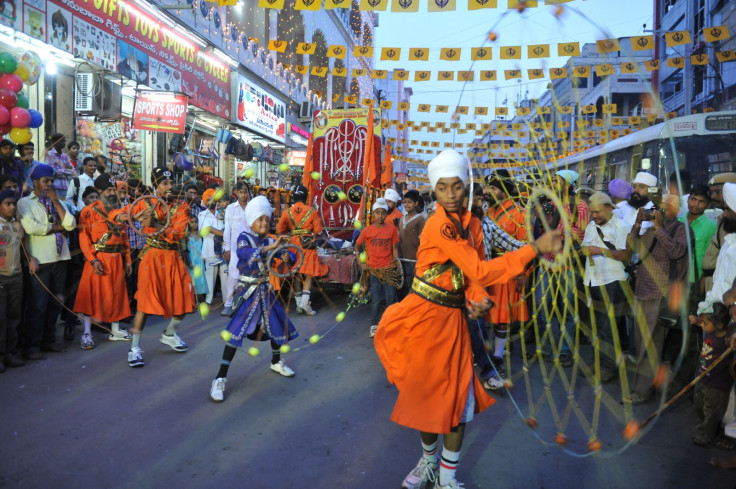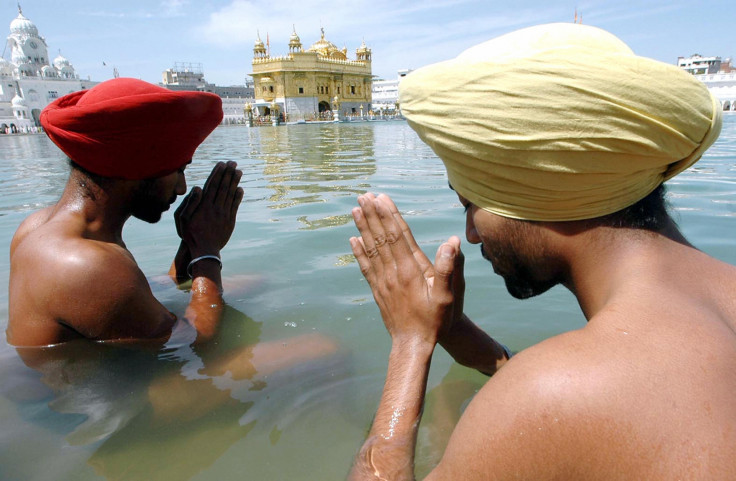Vaisakhi 2015: Origins and history behind the Sikh festival

Millions of Sikhs around the world will celebrate the centuries-old festival of Vaisakhi this week, one of the most important dates in the Sikh calendar. The festival marks several important dates, including the spring harvest festival, the Punjabi New Year and the year Sikhism was born as a collective faith in 1699.
Ahead of Vaisakhi, or Baisakhi, which falls on Tuesday 14 April this year, we look at the origins and history of the celebration.
Vaisakhi Origins
Vaisakhi takes place on 13 or 14 April each year and has long been celebrated as a harvest festival in the Punjab, as well as marking the Punjabi New Year. Vaisakhi is one of the main festivals celebrated by Sikhs, as well as Maghi and Diwali.
On the date of Vaisakhi in 1699, the 10th Guru of the Sikhs, Guru Gobind Singh (born Gobind Rai), laid the foundation of the Khalsa, the Order of the Pure Ones. The Guru wanted to create a unified group of people within the religion to defend their rights and the rights of the vulnerable. The Guru asked for five Sikhs to come forward and offer their lives to him. Eventually, five people came forward and they were taken one by one into his tent on a hillside.
Every time one of the volunteers went into the tent, the Guru returned alone with a sword covered in blood to a crowd of thousands. The five Sikhs re-emerged, however, dressed in turbans. The Guru announced that a new group called the Khalsa had been founded in the religion. The five who had offered their lives were to be known as the Panj Pyare, or Five Beloved Ones.
The five were then baptised into the Khalsa by the Guru, who sprinkled them with Amrit, meaning "immortalising nectar", the Sikh term for holy water, and said prayers. This is the basis of the Sikh baptism ceremony.
The first day of Vaisakhi is not considered to be a New Year across India, but only in certain regions. The festival coincides with New Year's Day – according to the solar new year – celebrated by people across the Assam Valley, Kerala, Odisha, West Bengal, Punjab, Haryana, Uttrakhand and other regions of India.
Vaisakhi is also an important date for some Hindus. For Hindus in the Punjab region, Baisakhi marks the beginning of a new solar year and is celebrated with worship, bathing and parties. It is also believed in the region that thousands of years ago, Goddess Ganga descended to Earth and in her honour, many Hindus gather along the Ganges River in north India and Tamil Nadu for ritual baths.

Celebrations
The festival is celebrated in Sikh communities around the world, with colourful processions called Nagar Kirtans, meaning "Street Hymn Singing". These processions take place across London, including the biggest Nagar Kirtans outside of India with 50,000 people.
In India, the main celebration takes place at Talwandi Sabo, where Guru Gobind Singh stayed for nine months and completed the recompilation of the Guru Granth Sahib – the Sikh scripture, which is also the 11th and last Sikh Guru. Major celebrations also take place in the Gurudwara at Anandpur Sahib, the birthplace of the Khalsa, and at the Golden Temple in Amritsar.
In Pakistani Punjab, Vaisakhi is widely celebrated by Sikhs in Western Punjab, with celebrations in the Panja Sahib complex in Hasan Abdal and various historical sites in Lahore. There is a Sikh community in Malaysia, but Vaisakhi is not a public holiday in the country.
Gurdwaras, the place of worship for Sikhs, host celebrations during the weeks of Vaisakhi, where readings of Sikh scriptures take place. Food is also fundamental to the Sikh faith and special meals are prepared during the festival.
The word Vaisakhi is written as Baisakhi when related to celebrations of the birth of Khalsa, or specifically to Sikhs. The standard spelling is Vaisakhi. In the Doabi and Malwi dialects of Punjabi, it is common for speakers to substitute a "B" for a "V" – so the spelling also depends on dialects.
© Copyright IBTimes 2025. All rights reserved.





















